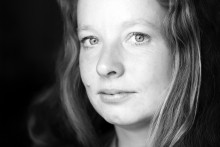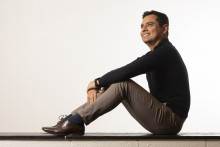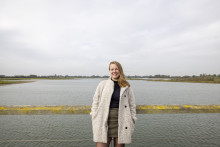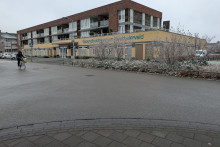wytske versteeg: writer and researcher
Wytske Versteeg (1983) is the author of four novels and one non-fiction book. Her literary debut De Wezenlozen (Weightless) was nominated for the Opzij Literature Prize 2013 and for the AKO Literature Prize. Her non-fiction book Dit is geen dakloze (This Is Not a Homeless Person) was nominated for the Jan Hanlo Essay Prize in 2008 and her second novel Boy won the BNG Literature Prize in 2014.
Versteeg has conducted a doctoral research at the UT Department of Philosophy (Faculty of Behavioural, Management and Social sciences). The title of her thesis is ‘How do you know? Everyday negotiations of expert authority’. She currently works as a researcher at the Utrecht University.
Why did a political scientist and novelist decide to become a PhD student at the UT?
‘The topic of the research was very interesting for me. I’ve always been interested in discourses, in the entitlement to speak, in how discussions work. This research was based on the method conversation analysis, and looked into how people negotiate about expertise - in much more detail than I was familiar with at the time.’
What was the main motivation for the research?
‘Nowadays you often hear that we live in the post-truth society, that facts don’t matter anymore. I wanted to know how people treat science in comparison to other knowledge sources, such as experience. I studied that with the use of conversation analysis. This method doesn’t focus on what words people say but on what they try to achieve with their conversation. For example, I might come home and say “These windows are really dirty.” This could be seen as a plain description or it could be an accusation – so my boyfriend could reply “I didn’t have time to clean them.” Although we are not consciously aware of it, we are constantly busy with evaluating what we can say or cannot say. If you analyze our conversations, you can start seeing patterns. I wanted to study how and when people make claims based on science and what they achieve with these claims.’
Can you walk us through your findings?
‘I found out that science is not treated as just another opinion. On the contrary. For example, I analyzed radio phone-in conversations and online conversations. In such settings, if you justify your opinion by experience, it can be easily undermined. People can just reply “You only believe that it is this way.” But if you refer to science, it’s a different matter. People don’t negotiate the relevance of science, but instead focus on who is allowed to speak on behalf of science. We all collectively guard the boundaries of science. Even in anti-scientific settings, such as anti-vaccinations websites, people refer to their data and research, present their claims as scientific – even if they would not be seen as such by scientists. Science is important to them. They want to show that they are not naïve or gullible. This shows that science is not just an opinion.’
Why is it important for us to know this? How can your findings be applied?
‘The method I used allows us to find things that people are not consciously aware of, things that we wouldn’t get from interviews, for instance. If you want to communicate about science, it’s important to learn what matters to this particular public. Hidden behind disputes about facts, are often questions of morality. What does it mean to be a good parent or responsible patient? Awareness of these everyday moralities helps to understand how people react to scientific expertise.’
Your PhD journey at the UT is almost over. What are your plans for the future?
‘I work as a researcher at the Urban Futures Studio at the Utrecht University. We work with stakeholders to make possible futures more tangible, to ensure a multi-voiced debate about the future. Often, scientists find facts and hand these over to politicians in reports that often would not be read. We research how we can go beyond that, how to make science experiential, so that it might better contribute to societal questions. On top of that, I’m still a writer. I’m currently working on two books – one novel and one non-fiction book. I like to keep busy.’







